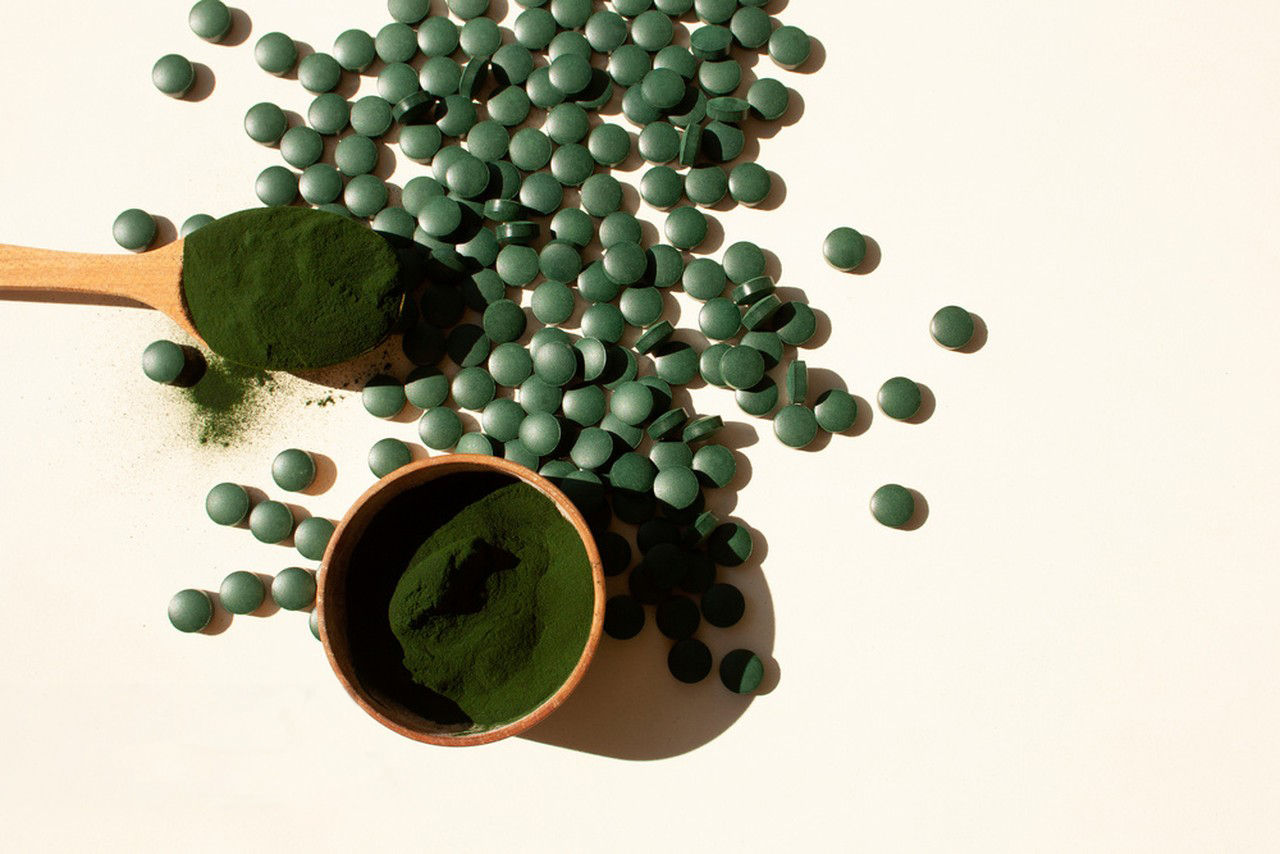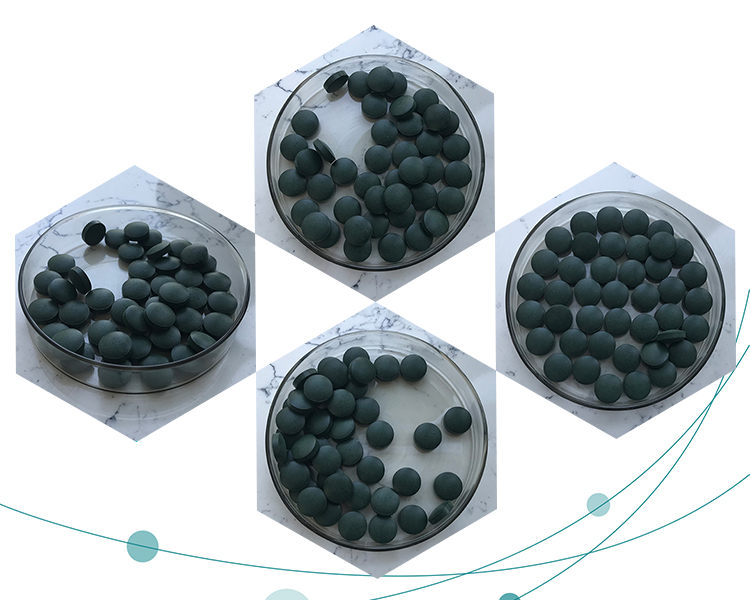Spirulina tablets are dietary supplements made from spirulina, a type of cyanobacteria, or blue-green algae. Spirulina is consumed in various forms, including tablets, capsules, powder, and flakes. Here’s an overview of its efficacy and effects when consumed in tablet form:
Nutritional Content: Spirulina is considered a superfood due to its high nutritional content. It is rich in protein, vitamins (such as B vitamins and vitamin E), minerals (such as iron and calcium), antioxidants (such as phycocyanin and beta-carotene), and essential fatty acids (such as gamma-linolenic acid).
Antioxidant Properties: Spirulina contains a range of antioxidants that help combat oxidative stress in the body. These antioxidants can neutralize free radicals, which are unstable molecules that can damage cells and contribute to various diseases, including cancer and heart disease.
Anti-inflammatory Effects: Spirulina has demonstrated anti-inflammatory properties in some studies. Chronic inflammation is linked to various health problems, including arthritis, diabetes, and heart disease. By reducing inflammation, spirulina may help alleviate symptoms associated with these conditions.
Immune System Support: Some research suggests that spirulina may enhance the immune system. It contains compounds like phycocyanin and polysaccharides that may stimulate the production of white blood cells and enhance the activity of natural killer cells, which play a crucial role in defending the body against pathogens.
Cholesterol Reduction: Several studies have indicated that spirulina may help lower cholesterol levels. It contains compounds like phycocyanin and gamma-linolenic acid, which may contribute to this effect. By lowering cholesterol levels, spirulina may reduce the risk of cardiovascular disease.
Blood Sugar Regulation: There is some evidence to suggest that spirulina may help regulate blood sugar levels, which is particularly beneficial for individuals with diabetes or insulin resistance. Spirulina contains compounds that may improve insulin sensitivity and reduce blood sugar levels.

Exercise Performance: Some athletes and fitness enthusiasts use spirulina supplements to enhance exercise performance and recovery. Spirulina’s high protein content and antioxidant properties may help reduce exercise-induced oxidative stress, improve endurance, and accelerate recovery after intense physical activity.
Detoxification: Spirulina is sometimes promoted for its detoxifying properties. It is believed to bind to heavy metals and other toxins in the body, facilitating their elimination. However, more research is needed to fully understand spirulina’s detoxification effects.
It’s important to note that while spirulina offers numerous potential health benefits, individual responses may vary. Additionally, more research is needed to confirm many of these effects and to determine the optimal dosage for specific health outcomes. As with any supplement, it’s advisable to consult with a healthcare professional before adding spirulina tablets to your routine, especially if you have any underlying health conditions or are taking medications.
Adverse effects of Spirulina Tablets
While spirulina is often touted for its potential health benefits, it’s important to note that like any supplement, it can also have adverse effects, particularly if consumed in large quantities or by certain individuals. Here are some potential adverse effects of spirulina tablets:
Allergic reactions: Some people may be allergic to spirulina, experiencing symptoms such as hives, itching, swelling, or difficulty breathing. Individuals allergic to seafood may be at a higher risk of being allergic to spirulina since it is a type of cyanobacteria, similar to algae.
Digestive issues: Spirulina may cause gastrointestinal discomfort in some individuals, including symptoms like diarrhea, nausea, or stomach cramps. This is particularly common when taking high doses or when first starting to use spirulina.
Liver complications: There have been rare reports of liver complications associated with spirulina supplements, including elevated liver enzymes. Individuals with liver conditions or those taking medications that affect liver function should exercise caution when using spirulina.

Heavy metal contamination: Spirulina supplements may be contaminated with heavy metals like mercury, lead, and arsenic, especially if they are sourced from polluted waters or poorly regulated manufacturers. Prolonged consumption of contaminated spirulina could lead to heavy metal toxicity.
Thyroid issues: Spirulina contains iodine, which is essential for thyroid function. However, excessive iodine intake can disrupt thyroid function, leading to hyperthyroidism or hypothyroidism, especially in individuals with pre-existing thyroid conditions.
Drug interactions: Spirulina may interact with certain medications, including immunosuppressants, blood thinners, and medications metabolized by the liver. It’s essential to consult with a healthcare professional before taking spirulina if you are on any medications.
Microcystin contamination: Spirulina can be contaminated with microcystins, toxins produced by certain species of cyanobacteria. Microcystin contamination can lead to liver damage and other adverse health effects if consumed in significant amounts.
Pregnancy and breastfeeding: The safety of spirulina supplements during pregnancy and breastfeeding has not been well studied. Pregnant or breastfeeding women should consult with a healthcare professional before using spirulina to ensure its safety for themselves and their baby.
Interference with autoimmune diseases: Spirulina may stimulate the immune system, which could be problematic for individuals with autoimmune diseases such as multiple sclerosis, rheumatoid arthritis, or lupus. It’s important for individuals with autoimmune conditions to discuss the use of spirulina with their healthcare provider.
Potential for contamination with other substances: Since spirulina supplements are not closely regulated, there is a risk of contamination with other substances or impurities, which could cause adverse reactions in some individuals.
It’s crucial to source spirulina supplements from reputable manufacturers, follow recommended dosages, and consult with a healthcare professional before adding spirulina or any other supplement to your routine, especially if you have underlying health conditions or are taking medications.
